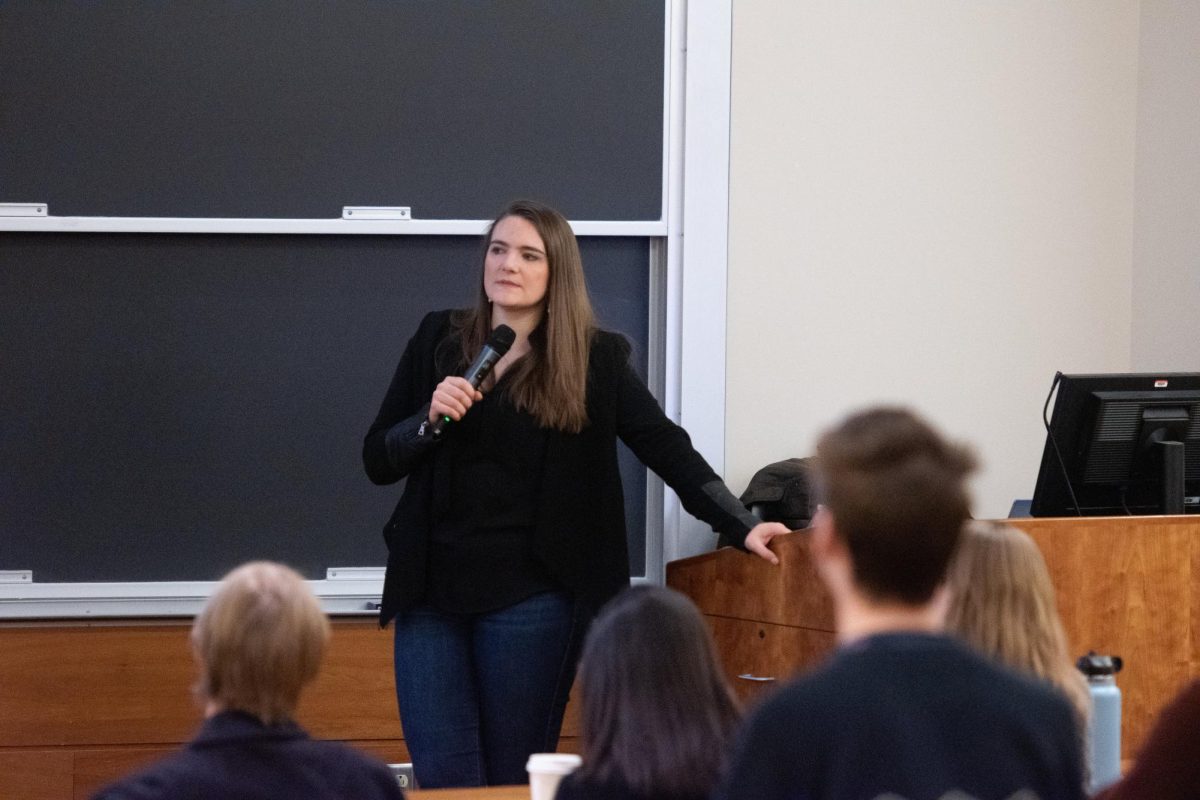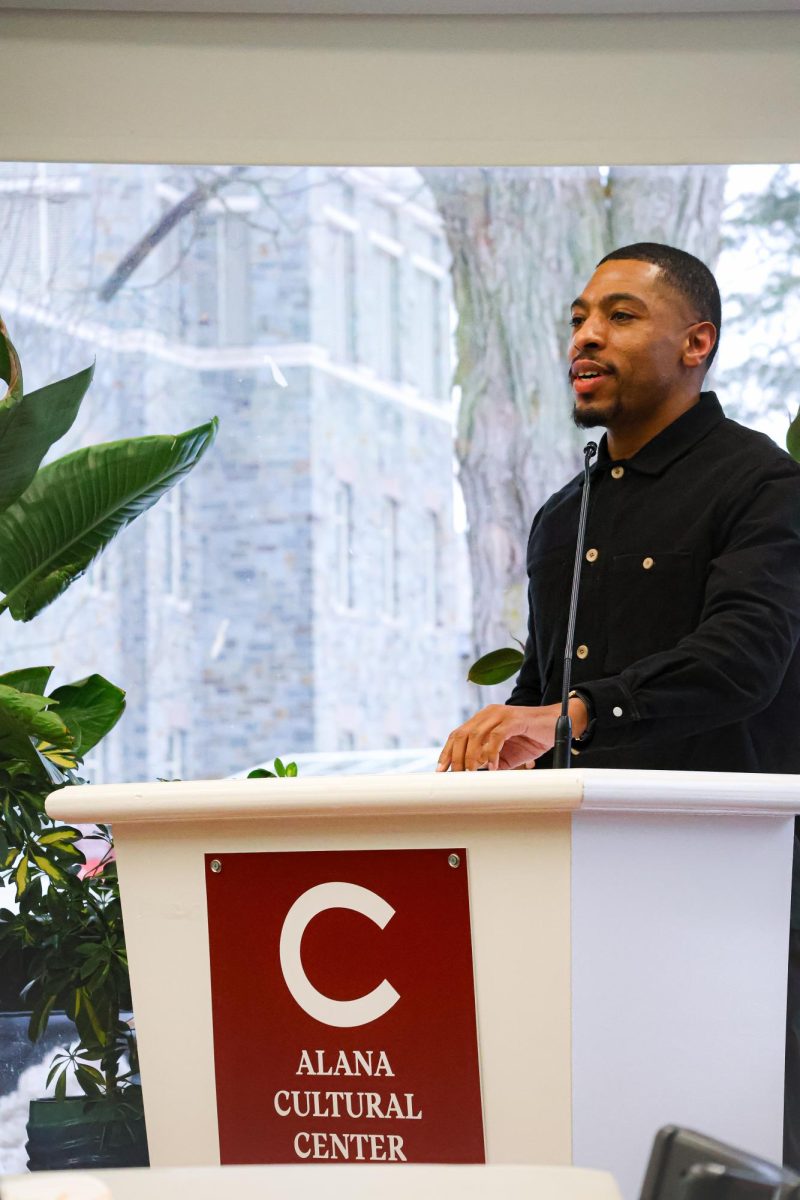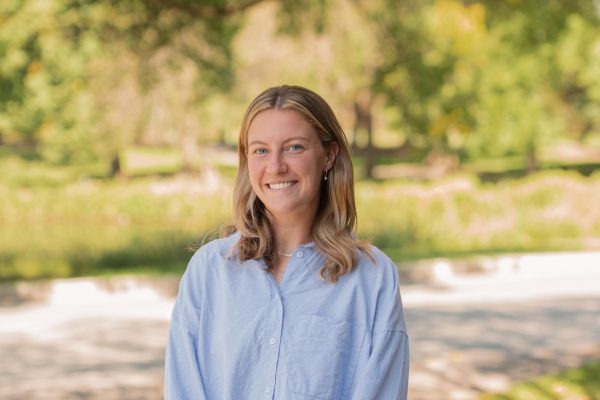The Colgate Maroon-News’ Milmoe Workshop in Journalism brought alumna Rebekah F. Ward ’13 to Colgate University on Thursday, Feb. 29. Ward’s arrival to campus was welcomed by an eager and inquisitive crowd in the Ho Science Center. The annual workshop — co-sponsored by the Office of Student Involvement and the Maroon-News — aims to provide student journalists insight into the careers and experiences of professional journalists. In recent years, the Milmoe Workshop in Journalism has previously brought journalists Ronan Farrow, David Fahrenthold and Ann Curry to campus.
The Maroon-News Editors-in-Chief, seniors Jesse Harris and Maya Karkhanis, introduced Ward’s extensive career.
“Rebekah Ward is a print and multimedia journalist specializing in climate and environment at the Houston Chronicle,” Harris said. “She is a member of Colgate’s Class of 2013 and is also an alumna of the Maroon-News, for which she served as a writer and later a copy editor during her time at Colgate.”
Ward previously held positions at UN agencies and France 24 prior to becoming an editorial reporter at Reuters. Before heading to the Houston Chronicle, she also served as an investigative reporter for the Albany Times Union.
Ward began her lecture on investigative journalism by putting “investigative” in quotation marks and clarifying how she defines the term.
“You should really be investigating anything that you are spending time doing journalism on,” Ward said. “The same tools that you use for investigative journalism you should be using in all the journalism you do.”
Ward then asked why we do journalism in the first place, and why we specifically pursue investigative journalism. She challenged listeners to think about what makes investigative journalism different and worthwhile compared to other careers that are also forms of activism for things we care about.
“[Journalists] are in a position to ask officials questions that the general public might really want to ask, but they don’t have that seat; they don’t have that space,” Ward said. “To be able to be that person asking questions, it’s not for everybody, but I think it’s a really special thing.”
Despite Ward’s extensive career in journalism, she wasn’t always sure this was the path for her. Ward highlighted she went through a period in her life where she was hesitant about pursuing journalism the year after she graduated from Colgate while on her Watson Fellowship.
“I had gotten myself into an ethical spiral, where I was questioning whether […] it was more important to do something that was more active [and] whether it was useless to do journalism because there are so many truths out there,” Ward said. “Could I do something that could have a different impact on the world?”
Ward eventually decided that there are many interesting and valid ways to tell stories in this world. While working on other projects with activists and media groups, there was something specific about journalism that she missed. Ward particularly missed how storytelling works in journalism. For Ward, when creating stories for a purpose and to be persuasive, journalists are bringing their own sense of what is important to the story that they are telling because their role is to get to the bottom of something and ask questions.
Beyond offering a peek into her path towards becoming a journalist, Ward provided the audience with journalistic skills they can implement into their own writing. Ward talked about story conception, collecting and focusing your writing and revising drafts. While teaching about these key foundational skills of journalism, she brought in personal stories from her beat. Regarding story conception, Ward emphasized reading between the lines.
“If you don’t have an ideas list where you write down any odd thing, any thought, any little thing that somebody tells you that you think of, then you’re going to lose out on some really interesting stories,” Ward said. “Let’s say you are sitting in a lecture or listening to an announcement from an official at school […] and there is something that is missing from that, write it down because that could be a story. There could be something that is unsaid there that could turn into your next big story.”
Assistant Dean Doug Chiarello was in attendance and expressed how he continued to be impressed with Colgate’s dedicated alumni and the benefits those connections provide for students.
“The Milmoe Workshop is a valuable resource for our students, and it has always impressed me how we produce so many talented alumni in the fields of journalism and communications without having a specific curricular program here on campus as a liberal arts university,” Chiarello said. “It is great to see our loyal alumni returning to campus to share their expertise and knowledge with our students and to further support our student staff and writers at the oldest college weekly in America.”
Chiarello wondered whether Ward’s visit will spark an interest in any of the student writers in attendance to consider exploring a career in investigative journalism, specifically after their time at the Maroon-News.
Ward left the crowd with one last piece of advice, stressing that students should not to wait for permission to be a journalist or do journalism. She advised students to take it upon themselves to write and submit their pieces to other outlets beyond what they are assigned, because taking the initiative to find stories is when one might uncover something truly important — something that cannot be dismissed.
















